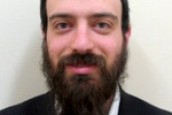In this week's Torah portion we read how Abraham sent his trusted servant on a mission to Abraham's homeland to find a suitable bride for his son Isaac. The servant, Eliezer, arrives and prays to G-d, asking for a heavenly sign to confirm his choice of a wife for Isaac. He would ask a young maiden for a drink of water and the one who would answer: "Drink, and I will also give your camels to drink" would be the proper choice for Isaac. Soon after making this "deal", Eliezer spotted a young girl, Rebecca, who had come to the well to draw water for her family. He ran over and asked her for a drink to which she responded "Drink and I will also draw water for your camels". He immediately knew that she was the one who would be the wife for Isaac.
Certainly an interesting way to choose a wife (especially for someone else!). But of all girls, what made him approach Rebbeca and try out his "test" on her? Our sages explain that as he watched her approach the spring, he saw something unique. He noticed that unlike everyone else, she didn't need to labour in drawing the water. The waters miraculously rose from the well towards her. He immediately knew that she was a good candidate for his "test".
Our sages knew this detail in the story by close examination of the text: When she first drew water for herself and her family, the Torah makes no mention of "drawing", it simply states that "she went down to the spring and filled her pitcher". When she brought water for his camels the Torah carefully describes how she ran back and forward "drawing water for all his camels". From this the sages understood that at the outset, she had not actually been required to "draw the water", rather it had wondrously come up to her.
But this begs the question: Drawing water for ten camels can be a strenuous task. If G-d had performed such a miracle for her when drawing for herself, why didn't the same miracle occur when she went to draw water for the stranger's camels? Such a miracle would have come in really handy then?
The answer lies in when the miracle occurred - when she was drawing for herself the waters rose towards her; when she was trying to assist another, a thirsty stranger and his camels, she had to work hard. G-d manipulated things in such a way because he wanted to teach us a valuable lesson: Mitzvah performance is not always a walk in the park. Judaism can at times be demanding. Similarly, doing a favour for another is not always easy. It's often easier to take care of oneself. When caring for another one has to be prepared to sweat. But it's the kind of sweat - sweating in the performance of a mitzvah - that is most dear to G-d.
It was through that kind of sweat and that sort of effort that Rebecca was chosen as the perfect candidate to be a Matriarch, a role model for the Jewish people.
 Rabbi Yaacov Chaiton
Rabbi Yaacov Chaiton